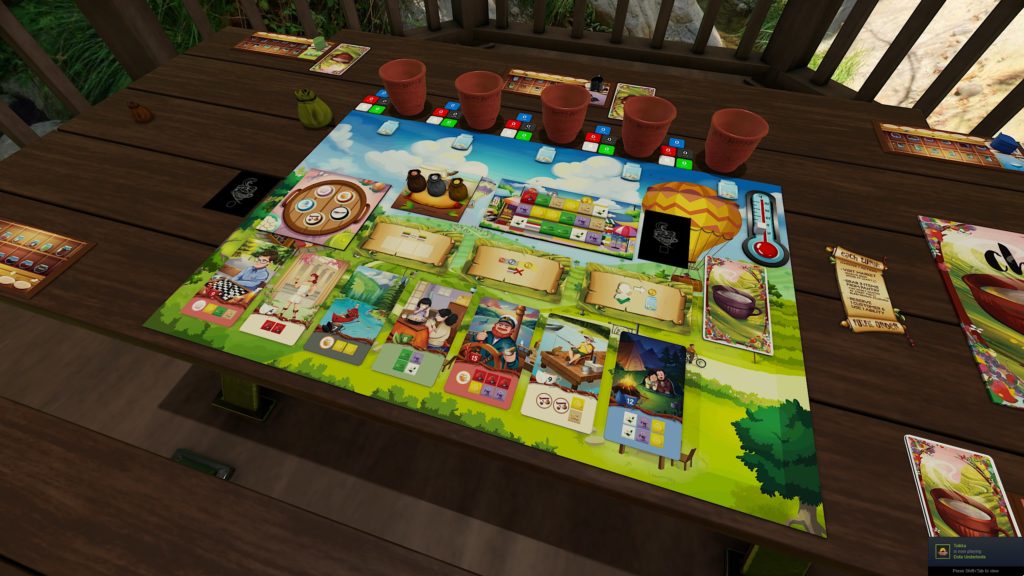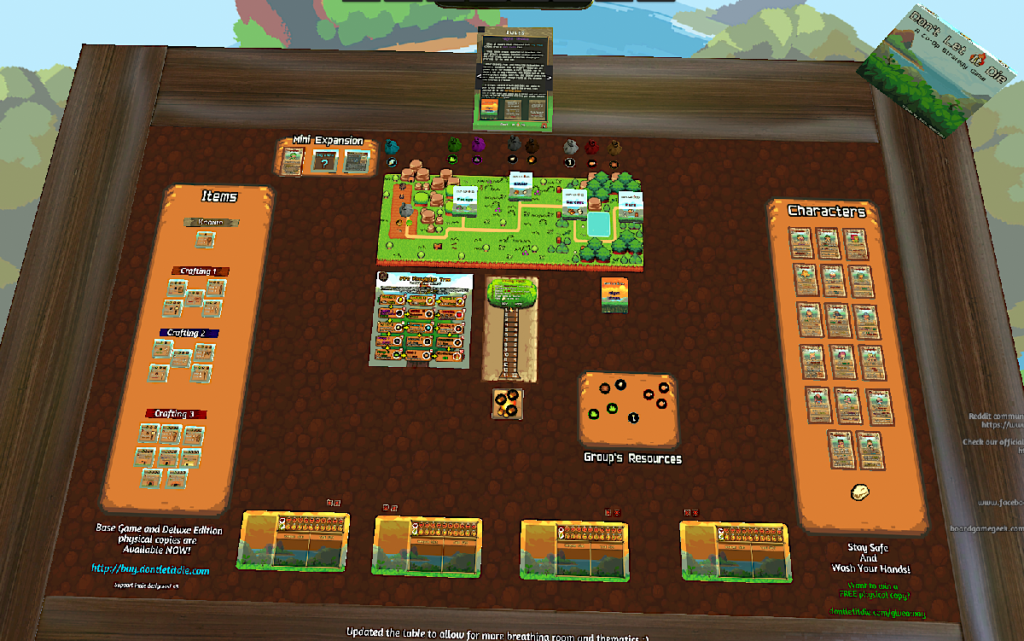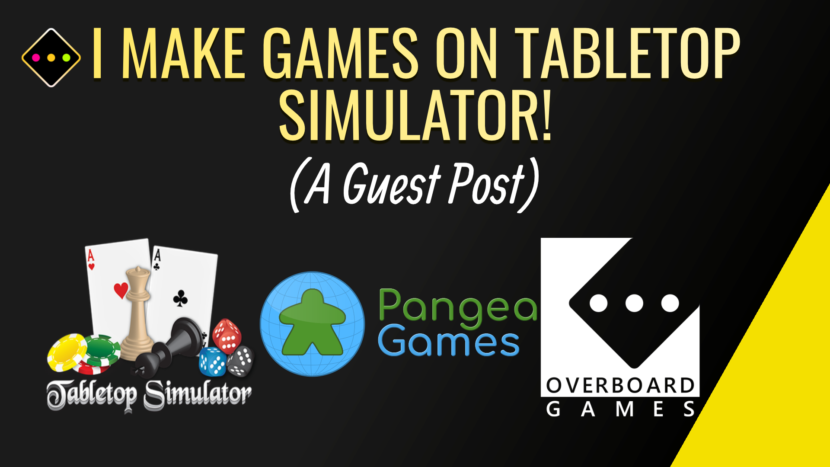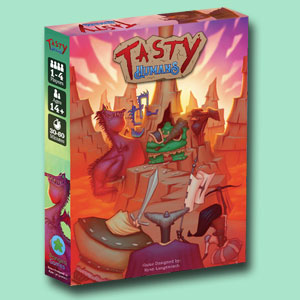As the coronavirus lockdown continues, a lot of people are having a hard time getting their board game fix. The ability to play board games online, however, has never been easier. That’s because it’s easy to make board games in Tabletop Simulator, an inexpensive board game simulation tool available on the Steam store.
Looking for more resources to help you on your board game design journey?
Here you go: no email required!
Like this writing style?
Check out my latest blog on marketing here.
I’ve talked about how you can create a Tabletop Simulator demo for your own game before. This week, though, I have something special in mind. Because so many people are interested in Tabletop Simulator right now, I want to introduce you to Kenny. Kenny runs the Pangea Games social media as well as a company called Overboard Games, which makes board games in Tabletop Simulator for various different publishers.

It’s a super cool niche for him to be in and I love his business model. That’s why I want to give him a chance to tell his story.
Who Am I & What is Tabletop Simulator?
Hey! My name is Kenny, and I create games on Tabletop Simulator for publishers and designers. I also create all the social media posts for Pangea Games, including the weird cheese question.
Tabletop Simulator is a physics-based board game engine which you can buy on Steam. With over 30,000 games, it’s the biggest platform to play all your favorite games. Overboard Games has made 30 games in Tabletop Simulator so far and that list will keep getting bigger.
If you’re looking to learn the game you can read our article, How to Learn Tabletop Simulator. You can learn how to install and then play the game like a pro.
How Did I Start?
I started playing board games originally on Tabletop Simulator in 2017. This later spawned an online community called Overboard Games. The Discord server grew over the years and it’s currently sitting at 700 members. I would love for you to join and play with other like-minded board gamers during this lockdown.
After a year of playing games, I decided to make board games in Tabletop Simulator from publicly available print-and-play games. My first creation was a demo of Blight Chronicles: Agent Decker for their Kickstarter which was simple but functional. I continued importing games for 7 months into Tabletop Simulator before commissioned to create Chai by Steeped Games.
How Chai Changed the Way I View Tabletop Simulator
Chai showed me what a Tabletop Simulator workshop creation needed, atmosphere, quality and a well-designed workshop page. Chai was the first game on the workshop to have a custom environment akin to the Tabletop Simulator DLC’s (downloadable content). This made the Tabletop Simulator creation stand out and it showed. It kept gaining followers and subscribers, which was fantastic!
From this point on, we knew that a custom environment was essential. Tabletop Simulator alone isn’t exactly the prettiest platform. With each game we created, our quality improved and we were able to provide better functionality.
Tabletop Simulator allows you to script functions within the game. This allowed us to take on more complex games and automate set-up. Something as simple as scripted setup can do wonders for your game. Shuffling decks, dealing tiles, and assigning first player at a push of a button is very useful.


This birthed our motto: “We don’t want to put your game on a table and call a day. We want your game to be a showcase to be used for a lifetime.” From that point on, we’ve worked top names including Portal Games, Stronghold Games, and Garphill Games. All the publishers and independent designers with whom I’ve worked have been wonderful about supporting the platform and my business. I’ve thanked them before and I’ll thank again them now.
Kickstarters & Tabletop: A Match Made in Heaven
We’ve worked very closely with games before they launch on Kickstarter. Without a shadow of a doubt, we can say that Tabletop Simulator demos have been beneficial. Board games are expensive, especially massive miniature-heavy games. Therefore, Tabletop Simulator allows board gamers to play before they pledge.
I believe Kickstarter has created a very impulsive way of buying board games. Tabletop Simulator, therefore, counters that trend. It will help you understand what you want to buy and what is just hype. I think we’ve all fallen victim to purchasing expensive games that we haven’t enjoyed.
Looking for more resources to help you on your board game design journey?
Here you go: no email required!
Like this writing style?
Check out my latest blog on marketing here.
The Unheard-of Benefits of Tabletop Simulator
Tabletop Simulator doesn’t just let people play before pledging, it’s also a great place to design and playtest games. Tabletop Simulator can be used to prototype your game with hundreds of people remotely with the freedom to change and customize on a whim. This freedom allows you to experiment with 100-foot minis or just 1 deck of cards. It’s entirely up to you.
Experimenting like this with physical components would be a very costly process. On a digital platform, the cost is basically zero. You pay $20 one time for Tabletop Simulator, and that’s it.
Of course, that’s all theory. Let’s talk about an actual person and their experience!
I’d like to share a story by Dustin Hendrickson. He originally developed and tested Don’t Let it Die on Tabletop Simulator so I reached out to him and this is what he said…
The Story of Dustin Hendrickson in His Own Words…
I’m a software engineer by trade, but have been designing and creating games since I was in middle school. After working on standalone video games as a one-man studio I decided to switch from video games to a childhood love of mine, board games!
Luckily, I also had extensive knowledge of Photoshop, so I set out to make my first board game using Photoshop and a software program called Tabletop Simulator. I had used Tabletop Simulator before to create some one-off custom mods and expansions for games such as Massive Darkness and Welcome Back to The Dungeon, but that was the extent of my actual board game design experience.
It didn’t take too long to get my workflow down for creating components in Photoshop and importing them into Tabletop Simulator. Some of the benefits that I immediately noticed was the speed at which I could make changes and get them to the table for testing.
I had luckily gotten the game approved for the Tabletop Simulator Spotlight section where they show off custom made content on the main game menu page. This kicked off the momentum and got tons of people to try the game and leave feedback. Blind playtesting of your games is very valuable when it comes to helping refine your rules and making sure your game is easily approachable.

How Tabletop Simulator Helped Dustin Hendrickson, in His Own Words…
Having a demo on Tabletop Simulator saves a ton of time and money. You would normally need to get physical copies made and shipped. Then any changes made would require a new print run of game components. It’s a money and time sink, but necessary!
Using Tabletop Simulator was also a great way to market without being sucked into the Facebook ads scene. I was able to offer the game for free to anyone who had Tabletop Simulator, which led to more people trying the game, liking it, and then telling their friends about it!
After getting a ton of messages from people asking about a physical copy, I decided to take the steps needed to make one. After tons of research, phone calls, and emails with tons of publishers and manufacturers, I decided the best route to get the game physical was to self-publish it on The Game Crafter and push the Tabletop Simulator version to create a fan-base worldwide, which would be needed if I were to crowdfund the game.
So all in all, Tabletop Simulator was monumental to the success of the Kickstarter campaign. It’s a valuable marketing, testing, feedback, and community-creating tool that all designers should take a look at. It may improve propel their efficiency and workflow when working on new game ideas!
Back to Kenny again…
Tabletop Simulator & A History of DMCA Takedowns
When I started playing games on Tabletop Simulator, there weren’t many publisher-approved creations. However, there were DLC’s – that started in 2015. Publishers at the time were strictly using Tabletopia since it has an official filtering system.
Tabletop Simulator, however, was living its life on the high seas of unofficial content. It didn’t last long, though. A few big publishers started sending DMCA copyright violation notices. At the time, the biggest DMCA was issued over Munchkin. Since then, Bang and Pandemic have gone thorugh the same thing.
One DMCA stands out above all others: the “Legend” DMCA. It’s said that Legend was DMCAed and forced to take down the Legendary Encounters series. However, this caused everything with the word “legend” in the name to be taken down, whether intentional or not. Oops.
For this reason, Tabletop Simulator doesn’t have the best reputation. However, over the years, publishers and designers have been using the platform in conjunction with mod makers like myself to promote their games.
This is great progress for Tabletop Simulator and for the industry as a whole. This way, we can respect Tabletop Simulator for what it’s doing for the industry. I anticipate the publishers and designers will continue to have mod makers create Tabletop Simulator versions of their games. Ultimately, we may see an official workshop list for big name games, which Berserk Games – creators of Tabletop Simulator – is looking into.
Final Thoughts on Making Board Games in Tabletop Simulator
Tabletop Simulator has a long history with a lot of bumps along the way. The freedom it offers us to create and play games with all our friends far outweighs the negative aspects.
I think as the years go by, Tabletop Simulator will garner more attention and support from publishers and designers. Tabletop Simulator can only improve and develop with your help, so please support it by downloading the game on Steam and uploading your board games as workshop items. And if you need help? We’ll be there!





